
News release: 8 Apr, Bangkok | |
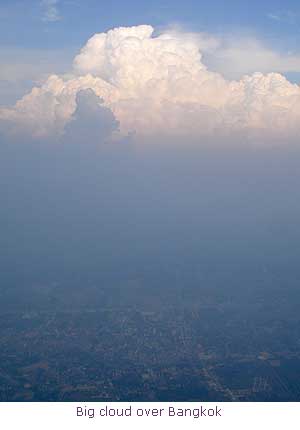 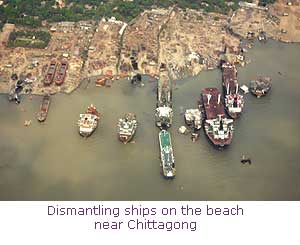 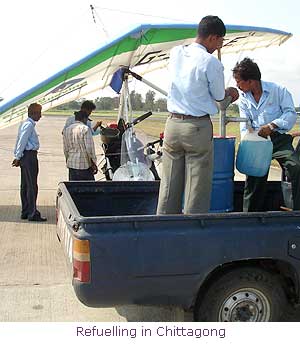 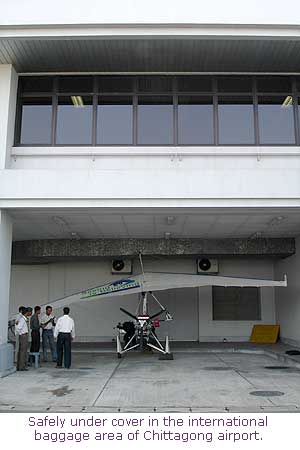 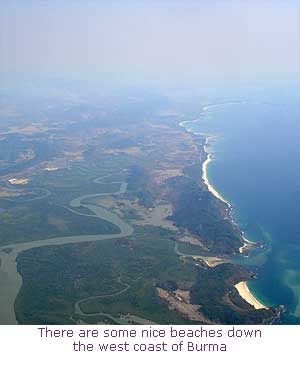 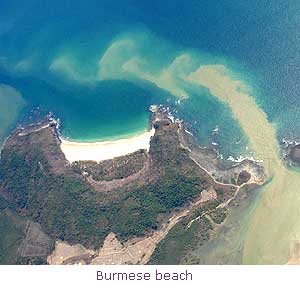 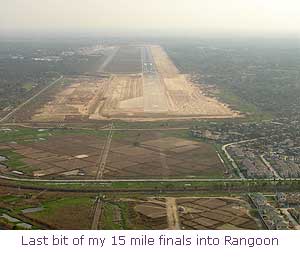 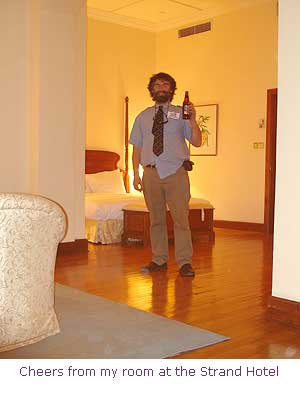 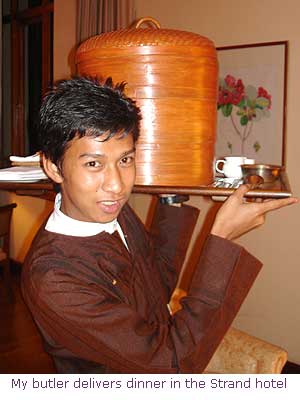 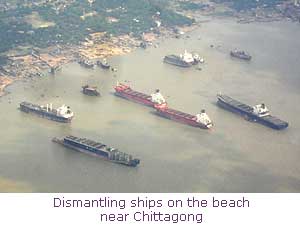 | Well we made it to Bangkok, but not quite as expected. Our next stop a couple of hours out of Dhaka was Chittagong. Besides Cox's Bazaar which doesn't have immigration or customs, this is as far as you can go in Bangladesh before getting to Burma. Once there we were going to have to make the difficult decision I outlined the other day - go the approved VFR route to Rangoon and run out of fuel, or go to Chiang Mai in Thailand via Mandalay for which we didn't have permission and which is politically sensitive, especially the second leg. I set off to the airport early to get all the paperwork going, leaving Miles in bed for an extra couple of hours because he wasn't feeling at all well. On the way to the airport I got a call; Miles is going to be flown directly to Bangkok, he'll have a chance to recover while you're on the way, and do more for Seeing is Believing there as well. This kind-of solved the problem of getting to Rangoon too, without him or all his heavy computer stuff there was a chance I might make it to Rangoon without having to stop en-route which, from what I've heard about Myanmar was going to be highly problematic for several reasons. Dhaka landing fees Etc. were very reasonable, the flying club didn't charge me anything for the hangarage which was kind, and it was a pleasant two hour flight to Chittagong. Just near Chittagong I flew over one of those extraordinary scrap yards where they somehow dismantle ships weighing tens or even hundreds of thousands of tons on the beach. It looks like they haul them in as far as they can and then just start dismantling them from the front, top down. As they get lighter they are hauled in a bit more until you just have the bit with the engine in it left, and then somehow they get that on-shore too. It's a very low-tech if, judging by the oil slicks, rather environmentally unfriendly way of doing things, but given the price of steel these days I've no doubt it brings in lots of cash. Chittagong is a pleasant little airport, half military, half civilian. Not long after arriving Sqn Ldr Sajjid Hossain the airport director had me sorted out with fuel and covered parking in the international baggage arrivals area. Rashidul Huda, the man from the bank came to take me to the Peninsular hotel in town. There was some sort of traffic crisis as it took two and a half hours rather than the normal 20 minutes to go the 10 miles there. I was back at the airport early next morning for the long flight to Rangoon, six hours at least, I reckoned. I took off No. 2 to a Mig 29. The first fifty or sixty miles were over Bangladesh and then suddenly there were paths rather than roads and I was in Myanmar, the land of the Generals. The approved VFR route is more or less down the coast for three hundred miles with two possible stops at Sitwe and Thandwe. Initially I had quite a headwind, my GPS was saying eight and a half hours to Rangoon, but things improved a bit as the flight continued. Sitwe is a fairly large town, I supposed there was a fairly good chance of getting fuel there. My friend Tim Farr had told me that Thandwe is a fairly remote airstrip for Burma's few tourists to go to the beach, my decision point lay between the two, but if I had to land at Thandwe would I find fuel? At the half way point I was just over half fuel remaining; there seemed to be no sign of any ATC at Thandwe, perhaps they were having lunch when I flew over, it wasn't a difficult decision to continue. Then it was up to six thousand feet to cross some rather rugged mountains over to the Irrawaddy plain. Nearing Rangoon I was at last back in touch with someone, quite low on fuel they made me hold for ages about twenty miles from the airport and then routed me in on a ten mile Jumbo jet final approach. In all it was a six and a half hour flight, I would never have made it with Miles. As usual I was parked between a couple of jets and the struggle began to find hangarage somewhere, nobody knew what to do. Eventually I was assigned my own personal security man who turned out to be extremely helpful, if firm about fees; yes, hangarage is available for $150 a day, and there was a marshalling fee (that's the man who plays table tennis) of $50. There seemed to be no negotiating these fees 'government rates' I was told. A large jet fuel tanker arrived, AVGAS? No. None in Burma. Car petrol then? There seemed to be rather a lot of humming and hawing about that too. Things looked as though they might get tricky. I was shown round to the hangar which was occupied by a bunch of helicopter people working for CHC supplying oil rigs out in the bay of Bengal. I made friends with Erin, a Canadian from near Vancouver who looked after the engines of the two Super Pumas stationed there. He explained that you either bought petrol in bottles on the back streets or I might be able to get some from one of the very few government petrol stations where state officials and foreigners can buy petrol with US dollars cash, but it might be difficult into a can, he thought the best stuff was 92 octane, and the nearest station was quite far away. Taking care to make sure I was holding the passport with the Burma visa in it and not my other one, my security man guided me efficiently through immigration and customs and then back into the airport through the maintainance entrance. I made sure he briefed the security there that I could come and go as I pleased as it was going to be two trips at least to get fuel in my removable reserve tank. Erin took me to the petrol station with his driver on his way home, the dollars cash seemed to do the trick and they filled me up. I had been told I was booked into the Strand hotel, this is one of the World's great hotels. It didn't seem to phase them at all that the majority of my luggage consisted of a strangely shaped tank full of evil smelling petrol which might not be good enough for my engine, but the only stuff available. After a long day my personal butler provided me with a delicious dinner in my room. Foreign mobile phones don't work in Burma, land lines seemed to be no better, and one has to be 'discreet' with sat phones in Burma. The connection wasn't very good from my windowsill but I managed to get a message to Jon Cook that all was OK and spoke briefly to Nigel Beale about the petrol, his advice was to keep a close eye on the exhaust temperatures and everything should be OK. At least without Miles the thing wasn't working as hard as usual. I was at the airport at dawn the next morning to pour my petrol into the main tank and then return to the government fuel station for the second time. In total I needed 68 litres so solo I've got something like 8 hours endurance on this machine, a lot more than the 5 1/2 or so when Miles is with me. It's still quite a long flight to Bangkok, 330 Nm. Miles and I had done this distance in Saudi Arabia but our friendly tail wind has deserted us so had Miles been with me it's a bit doubtful we'd have been able to make it in one go, solo it looked quite easy, in fact it was just over a five and a half hour flight, on the very limit of our endurance two-up and it wouldn't have been very comfortable flying into a major international airport with just a smell of petrol in the tank, as it was I still had plenty. Half way between Burma and Thailand there was sixty or seventy miles of very rugged mountains, the same mountains in which tens of thousands of allied POW's died building that railway immortalized 50 years ago in the film Bridge over the River Kwai. In fact there is, or was no river Kwai as the word actually means river in Thai. Once it became an important tourist attraction in the 1970's they renamed the river Khwae Mae Klong at Kanchananburi to just Kwai, so now it's the river River. Most people don't realize the real thing is made of steel rather than wood, it was brought in pieces from Java, the tracks from Malaysia, and completed in April 1943. I climbed gently to eight thousand feet to clear the mountains, the engine gave the occasional cough which kept me awake, crappy Burma fuel I supposed, but the temperatures were OK. Then I got weather, my first encounter with thunderstorms on this trip, I diverted twenty miles or so north of track to keep clear of the worst of it; it was a relief to get over the great central plain of Thailand. Although just as green as Burma, dramatically different, with plenty of surfaced roads and fields obviously cultivated by machine rather than by hand. As I neared Bangkok it started getting ominously dark and I heard big jets constantly calling for heading changes on account of weather but as I got nearer I could see a big black cloud but it seemed to be around the new Suvarnabhumi airport fifteen miles or so beyond my destination of the old international airport which has been relegated to domestic, military and biz traffic. Their radio was pretty terrible, it took several confirmations for me to be really sure they wanted me to land the opposite way to the direction I could see a jet had just landed, and then they decided I should land on 21 left rather than 21 right just as I was about to turn finals, it was all a bit confusing. At least once I was on the ground someone was waiting for me, and a follow-me car guided me straight into a hangar just before it rained. The chaps at Royal Aviation Services presently hold the record for the most efficient service. I couldn't have been safely parked up and whisked through immigration, customs and out of the airport faster. It was a public holiday in Thailand so didn't even encounter the famous Bangkok traffic and I was soon at the Bangkok Holiday Inn where Miles has been installed the last couple of days. He seems a lot better. He's still feeling a bit fragile but has been doing quite a lot of media stuff for Seeing is Believing between visits to the loo. I'm endlessly impressed by Standard Chartered Bank's staff dedication and real involvement with their charity. Please do think of making a donation yourself, it's easy to do online at the Seeing is Believing website, for every dollar you give the bank contributes a dollar and covers all expenses so every cent of your contribution goes to restoring sight to people who otherwise can't afford it. It's a really good cause. |


